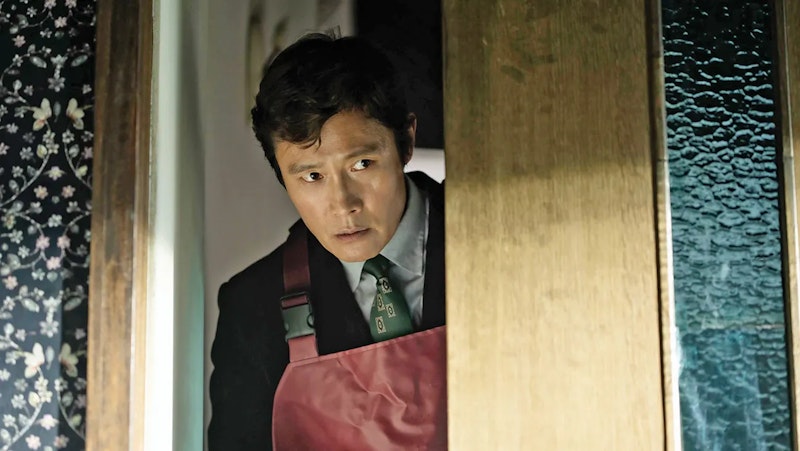It’s no secret that South Korean cinema has experienced a New Wave that emerged in the 1990s, and it hasn’t slowed down since then. Despite a much smaller population than a majority of the world’s most industrious film markets, South Korea has had an unusually high percentage of challenging new releases that also became mainstream hits. It’s not an initiative that has existed as a single entity, but there are trends that have gained momentum based on the auteur style of distinctive voices behind the camera. If the “New Hollywood” era of the 1970s is tied to the works of Martin Scorsese and Steven Spielberg, then the dawn of the South Korean cinematic renaissance is linked to Park Chan-wook.
Park’s work has had such a wide-ranging influence on international cinema that it’s easy to forget how transgressive his films were upon their initial release. Oldboy inspired countless close-quarter action sequences in the last two decades, and direct homages have appeared in everything from John Wick to Guardians of the Galaxy; it also redefined the notion of “extremist” filmmaking, and proved that deliberately shocking material could be artful, thought-provoking, and beautiful in a cruel way. Had Park’s latest film only contained the aggressive, hypnotic masochism of his earlier work, it would likely be labeled an impressive, if familiar late-career throwback. The brilliance of No Other Choice isn’t in content, but in approach; Park’s adaptation of Donald Westlake’s novel The Ax is an acidic, violent caper with the broadly comedic sensibilities of a Happy Madison production.
It’s a distinctly American notion to cast well-known movie stars “against type” to challenge expectations, and this year has seen celebrities like Will Arnett, Adam Sandler, Liam Neeson, and even Dwayne Johnson aspire to be taken seriously. Park has employed a similar tactic with No Other Choice through his selection of famed action star and martial artist Lee Byung-hun to play the protagonist Yoo Man-su, a career employee of one of the nation’s largest pulp and paper companies. Lee first worked with Park on the cult classic neo-noir thriller Joint Security Area, and made a splash in America through appearances in English-language blockbusters like Terminator: Genisys, G.I. Joe Retaliation, The Magnificent Seven, and Red 2. It’s clever casting because Lee’s career resembles that of Man-su’s; once a tradesman within a unique field, he’s now unnecessary due to an evolution in technology. In the same way that stunt artists and action stars have been made irrelevant by the increased use of AI, a paper expert has no purpose within a society where all interactions are digital.
Man-su seemingly has a perfect life, a happy marriage with his wife Lee Mi-ri (Son Ye-jin), two intelligent children, and a gorgeous home that could’ve been lifted from a tourism advertisement. An opening scene set amidst an idealistic family barbeque is so cheerfully idealistic that the tension’s heightened for the inevitable twist. Man-su is abruptly fired and forced to work low-wage blue collar jobs during his desperate quest to earn an interview. He’s found that he may have to forsake his beloved property, even after his wife has made the decision to cut down on luxuries. After he’s finally scheduled for an interview with a rival paper company, Man-su makes it a priority to eliminate the competition by any means necessary.
The Ax was an American horror novel from 1997, where it was taken as a satire of the financial deregulation of the Clinton administration, which resulted in a booming economy. Although it was first adapted to the big screen in 2005 by Costa-Gavras, interest in a new update spiked in the aftermath of the 2008 recession, where the job market dwindled for educated middle-class homeowners like Man-su. Even if No Other Choice is targeted at the global economic turmoil that steadily infected South Korea, Park’s able to make a broader point about the fatuous nature of capitalism. As ridiculous as it is for a relatively talentless, narcissistic man like Man-su to live in a mansion, it's equally ridiculous that it could be taken from him overnight.
It's the hustling skills that Man-su learned during his year-long stint as a gig worker that has made him well-suited to literally skewer his rival applicants. Man-su has none of the methodical espionage and combat skills that Lee has displayed in his more action-centric roles, but the one benefit of being a jobless nobody is an ability to disappear. Man-su learns quickly that his lifetime of privilege and entitlement hasn’t earned him any favors. No Other Choice walks a fine line in how sympathetic Man-su is; he’s far too incompetent to be taken as a threat, and his mournful contemplation on his failings as a married man are more pathetic than heart-stirring.
No Other Choice attacks Man-su’s idealistic imagination of his simplistic scheme through the added consequences of each adversary he’s taken out. The increasingly incoherent series of excuses he’s formed to hide his criminal activity has created a house of cards that’s doomed to collapse at any moment, and the ramifications are professionally draining and personally embarrassing; even if there was some sort of honor in Man-su’s determination, he’s placed in scenarios where he’s mocked for his inadequacy as the masculine head of the house. Man-su’s made to look like a bumbling fool whose misfortune is tragicomic, but Park is able to insert a few careful reminders that he’s still a man who, in his eyes, has no other choice to save his future. It’s through this careful calculation of the viewers’ sadism that Park is able to make his point; it’s all very funny until it happens to you.

